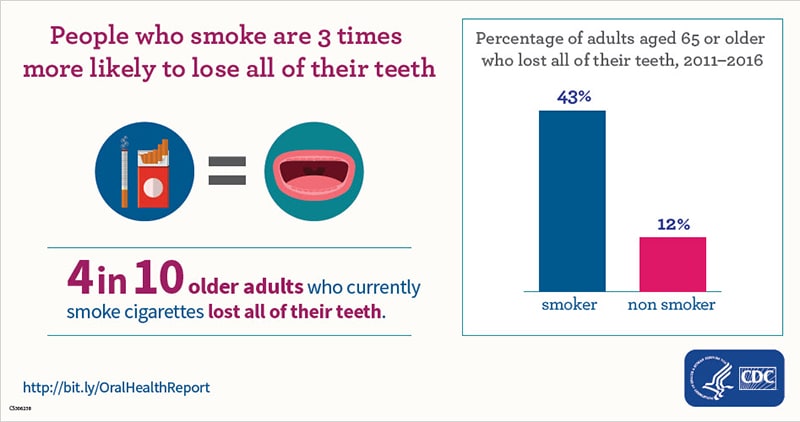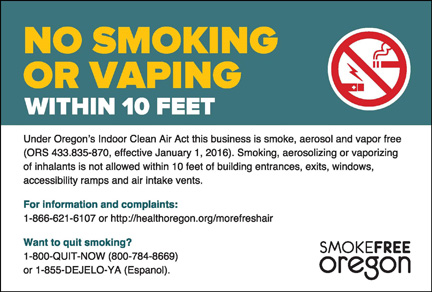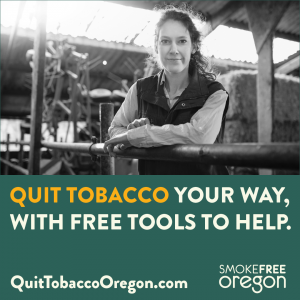Tobacco Prevention and Education
Tobacco use remains the number one cause of preventable death in Oregon. Tillamook County’s tobacco prevention and education program (TPEP) staff works with local and state partners to promote smoke-free environments, prevent youth from starting tobacco use and encouraging tobacco users to quit.
The Tillamook County 2019 Tobacco Fact Sheet provides details on how tobacco affects our community.

For Current Tobacco Users
Get Help Quitting Tobacco
- The Oregon Tobacco Quit Line: For Oregonians who are ready to quit tobacco. Text READY to 200-400 or call 1-800-QUIT-NOW (1-800-784-8669).
- The Quit Line is open 24 hours a day, seven days a week. The Quit Line is a telephone and web-based counseling service to help Oregonians quit using tobacco and nicotine products. When you call or visit the Quit Line online, you will be asked to register for the program. Once you are registered, staff will explain what Quit Line counseling benefits are available to you and ask if you would like to start counseling now, or schedule a counseling call at a time that is convenient for you. Once you sign up with the Quit Line, you can:
- Talk or chat online with an expert Quit Coach who knows what you are going through and will help you make a Quit Plan that will work for you.
- Get more help from your Quit Guide — we’ll send you materials chosen just for you or you can access our library online.
- Ask for support — tell your family and friends about your Quit Plan or join our message boards online and connect with others quitting tobacco.
- Receive 2 weeks of nicotine patches and/or gum to help you get started with your quit (if eligible).
- If you ever need more help, call us again for free. Contact the Quit Line today at 1-800-QUIT-NOW (1-800-784-8669) or online at www.quitnow.net/oregon.
- For other language options, see below. The Quit Line can also connect you to interpreter services in over 240 languages and dialects.
- Deaf and hard of hearing: 1-877-777-6534
- The Quit Line is open 24 hours a day, seven days a week. The Quit Line is a telephone and web-based counseling service to help Oregonians quit using tobacco and nicotine products. When you call or visit the Quit Line online, you will be asked to register for the program. Once you are registered, staff will explain what Quit Line counseling benefits are available to you and ask if you would like to start counseling now, or schedule a counseling call at a time that is convenient for you. Once you sign up with the Quit Line, you can:
- Línea quitline en Español: Ayuda las 24 horas del día, los siete días de la semana. Más información aquí. 1-855-DÉJELO-YA (1-855-335-3569)
- Oregon Native Quit Line: For American Indians and Alaskan Natives who want to quit commercial tobacco. Call 1-800-QUIT-NOW (1-800-784-8669), then press “7”
- Asian Smokers’ Quitline: For Asian language speakers ready to quit tobacco. Visit the website for language-specific phone numbers or to sign up online.
- Mandarin / 普通话 and Cantonese / 粤语 / 广东话: 1-800-838-8917
- Korean / 한국어: 1-800-556-5564
- Vietnamese / Tiếng Việt: 1-800-778-8440
If you or someone else you know uses or is thinking about using e-cigarette/vape devices, cigarettes, or other tobacco, there is help available.
- Text QUIT to 47848 or visit Tools for Quitting | Smokefree Teen for free tools to quit smoking, vaping, or using tobacco.
- This is Quitting: A free resource to help teens and young adults quit vaping. Visit their website or text DITCHVAPE to 88709 to get started.
- This is Quitting for parents: For parents and/or caregivers of young people who vape. Text QUIT to 847-278-9715
- BecomeAnEX: Support community for parents of youth and young adults who use tobacco. Text QUIT to 202-899-7550 or sign up online.
- This is Quitting: For teens and young adults who want to quit e-cigarettes. Text DITCHVAPE to 88709
- This is Quitting for parents: For parents and/or caregivers of young people who vape. Text QUIT to 847-278-9715
- BecomeAnEX: Support community for parents of youth and young adults who use tobacco. Text QUIT to 202-899-7550
- SmokefreeTXT en Español: Para adultos en Estados Unidos que hablan español y que están listos para dejar de fumar. Envíe un mensaje de texto con la palabra ESP al 47848
- DipfreeTXT: For young adults who are ready to quit dip. Text SPIT to 222888
- SmokefreeTXT for Teens: For teens aged 13 to 17 who are ready to quit smoking. Text QUIT to 47848.
- SmokefreeVET: For veterans who are ready to quit tobacco. Text VET to 47848
- SmokefreeMOM: For pregnant women who are ready to quit tobacco. Text MOM to 222888
- Become an Ex: Community: Join a community of people who decided to quit. Get support and advice from others and feel supported on your quit journey.
- Kill the Can: An online support community and resources for those trying to quit smokeless tobacco, including all brands & types of chew, dip, snuff & spit tobacco.
- Outlast Tobacco: Information and tips specifically for LGBTQ+ individuals to help motivate your quit.
- SmokefreeOregon: A website from the Oregon Health Authority with information about more tobacco cessation resources, ongoing work to prevent tobacco use, and ways to get involved with preventing commercial tobacco use in your community or tribe.
- CPCCO Stop Smoking: Information from Columbia Pacific CCO, Tillamook’s local Oregon Health Plan (OHP)/Medicaid provider, about the benefits of quitting tobacco and the resources and coverage available to help you quit for good.
- Smokefree.gov: A website full of tools and tips to help people quit any type of tobacco. This includes tailored information for many different populations, including veterans, women (including those who are pregnant or parenting), teens, and adults age 60+.
- SmokefreeEspañol: Hay maneras para hacer que dejar de fumar sea más fácil. Obtenga información sobre las herramientas para dejar de fumar como nuestro programa de mensajes de texto SmokefreeTXT en español, líneas para dejar de fumar y el chat en vivo LiveHelp.
- How to Quit Smoking: Tips and resources from the CDC to help you start your quitting journey today.
- Be Tobacco Free: Additional tools to help you quit tobacco for good.
- Talk to your provider: Working with a health care provider, such as your doctor, dentist, or pharmacist, can increase your chances of quitting tobacco for good. They can help you personalize a quit plan that works best for you. They can also refer you to counseling and prescribe nicotine replacement therapy (NRT) and/or other medications. It is proven that using a combination of cessation methods (e.g., counseling and medication) leads to the best chance of success. Most health insurance plans, including the Oregon Health Plan and Medicare Part B, are now required to cover some level of tobacco cessation treatments. Check your health plan to see which cessation treatments are covered. For more tips on how to start the conversation with your provider visit: https://smokefreeoregon.com/oregonians/helping-people-quit-tobacco/im-ready-to-quit/
Someone who feels supported is more likely to quit tobacco for good. Here are some tips that can help you support the person in your life who is quitting tobacco.
Listen
- Quitting smoking is about them—not you. Listen to what they have to say.
Don’t Lecture
- Lectures and nagging won’t help your friend or family member quit smoking. It might just put you on their bad side, and they may not come to you for help when they really need it.
Offer Distractions
- Lend support to your friend or family member by engaging them in tobacco free activities. If you’re still using tobacco products, avoid using around them.
Be Patient and Positive
- Supporting someone who is trying to quit smoking can be frustrating and exhausting. Focus on staying upbeat. Don’t give up on them. Your support is important.
Don’t Be Too Hard on Them if They Slip
- Your friend or family member may slip at some point. They’ll probably feel guilty, so getting angry with them will not help.
Celebrate Successes Big and Small
- Recognize your friend or family member’s tobacco free successes and milestones. Staying smokefree for one day, one week, or one year are all reasons to celebrate.
Help Them De-stress
- Quitting smoking can create a lot of stress. If you notice they are stressed, help them break the cycle by finding healthier ways to de-stress.
Be There for the Long Haul
- The challenges of quitting smoking don’t end when a person decides to quit. Cravings can pop up weeks, or even months, later.
Visit https://smokefree.gov/help-others-quit/how-to-support-your-quitter for a more detailed list of supportive ideas.
Other Health Support for Tobacco Users
Cigarette smoking continues to be the leading cause of preventable death in the United States, causing more than 480,000 deaths per year, and it can significantly increase the risk of serious health conditions. Smokers are more likely than nonsmokers to develop heart disease, stroke, and lung cancer, and cigarette use contributes to many other types of cardiovascular disease, respiratory disease, and cancer. Other forms of tobacco use (including vaping) can also have detrimental health effects, including damage to lungs and increased risks of certain types of cancer.
Other health risks of tobacco use include:
- Increased risk of pregnancy complications
- Decreased bone health
- Increased risk of gum disease and tooth decay
- Premature aging of skin
- Increased risk of cataracts and age-related macular degeneration (diseases of the eye)
- Reduced fertility
- Increased risk of developing type 2 diabetes, and making diabetes harder to control
- Increased risk of rheumatoid arthritis
Even if you aren’t ready to quit tobacco, working with a healthcare provider can help you better manage your health and decrease some of these risks. And, when you’re ready to quit, your healthcare provider can assist you in accessing tools to help you succeed, including medications and counseling.
To get started, call us at (503) 842-3900. You can also learn more about our primary care providers here: https://tillamookchc.org/provider-bios-2/
If you are a tobacco user, it’s important to keep up with regular oral health care. In addition to the increased risk of oral cancer, tobacco in all forms (including cigarettes, smokeless tobacco, and vaping/e-cigarettes) can contribute to gum disease, tooth decay, and other oral health problems. Over 40% of adults aged 20 to 64 who currently smoke cigarettes have untreated tooth decay, which is higher than in non-smokers.
To protect your teeth and oral health, the best thing you can do is quit tobacco. Even if you aren’t ready to quit, you should also continue to get regular care from a dentist, including cleanings and comprehensive oral health exams. They can help catch problems like tooth decay or even oral cancer early, which leads to better outcomes.
If you’re ready to schedule a dental appointment, you can call our dental office at 503-842-2356. You can also check out our Dental Page to learn more about our providers and the dental services we offer.

Quitting tobacco is hard, but it can be easier with counseling and support. Many people continue to use tobacco for a number of reasons, including habit, social cues, anxiety or depression, or not wanting to experience withdrawal symptoms.
Patients at TCCHC can access our integrated behavioral health services and meet with a behavioral health clinician to get support for quitting tobacco. They can also be seen for other conditions that may increase risk of tobacco use, such as mental health needs or substance use.
Call us at (503) 842-3900 to get started, or visit https://tillamookchc.org/provider-bios/ to learn about our behavioral health providers. You can also learn more about the behavioral health services we offer at https://tillamookchc.org/behavioral-health-services/.
For the Community
Preventing Youth Tobacco Use
In 2017, Senate Bill 754 was signed into law, raising the required minimum age for a person to legally buy or obtain tobacco products, inhalant delivery systems, and tobacco product devices from 18 to 21.
National data show that about 95 percent of adult smokers begin smoking before they turn 21. The ages of 18 to 21 are also a critical period when many smokers move from experimental smoking to regular, daily use.
By raising the age to purchase or obtain tobacco products to 21, we are helping to protect vulnerable adolescents from the harmful effects of tobacco and limit the number of youth that start using tobacco at any point in their lives.
It is not a violation for anyone under age 21 to purchase, use, or possess tobacco products, only for retailers to sell these products to minors.
In 2021, Oregon passed Senate Bill 587, which requires retailers to get a license to sell tobacco products and e-cigarettes. As of January 1, 2022, any retailer selling tobacco or vaping products in Oregon must have a license. Before 2022, Oregon was one of only seven states without a statewide tobacco retail license program.
This new license, similar to liquor and cannabis licensing laws, was created to increase retailer knowledge and compliance of federal and state laws regulating the sale of tobacco and vaping products. In other states, similar licensing programs have helped to reduce youth access to tobacco in the community. Tobacco retail licensing allows OHA to monitor local businesses and make stores healthier places for everyone to shop. This policy can also support other retail policies to address concerns such as youth access to tobacco, youth exposure to marketing, retailer location or density, and retailer incompliance with federal or state laws.
Senate Bill 587 also removed tobacco purchase, use, and possession (PUP) penalties for youth under the age of 18, due to the ineffectiveness and inequity of this type of enforcement. It is not a violation for anyone under age 21 to purchase, use, or possess tobacco products, only for retailers to sell these products to minors. To learn more about PUP laws and why these penalties were removed, visit https://www.changelabsolutions.org/sites/default/files/2019-05/PUPinSmoke_FINAL_2019-04-17.pdf. An overview of resources to help young people who want to quit smoking or vaping are in our For Current Tobacco Users section.
To learn more about Oregon’s tobacco retail license program, visit www.healthoregon.org/tobaccoretailsales.
Tobacco-Free Environments

Oregon’s Indoor Clean Air Act (ICAA) protects nearly all Oregonians from the harms of secondhand smoke and vapor. The ICAA creates smoke free public places and places of employment with the intent of protecting the health of employees and the public. Tobacco remains the main cause of preventable death and disease in the United States, including in Oregon.
The ICAA prohibits smoking, vaporizing and aerosolizing of inhalants in and around public places and places of employment. Smoking, vaporizing and aerosolizing of inhalants is also prohibited within 10 feet of all entrances and exits (including stairs), accessibility ramps that lead to or from an entrance or exit, windows that open, and air-intake vents.
Compliance with this law is the responsibility of the owner, manager, or other person in charge of a location covered by the ICAA. Businesses are not required to allow smoking on the premises. At any time, an owner may designate the entire business premises tobacco-free or smoke-free.
Some cities and counties in Oregon have enacted stricter local smoke free workplace laws. Employers must comply with all local laws, though OHA enforces the state law only.
For more information, visit the Oregon ICAA website.
The ICAA is a complaint-driven law, meaning it is only enforced when a member of the public (including an employee) reports a violation. To report a violation, call 1-866-621-6107 or visit http://healthoregon.org/morefreshair.
To promote the long-term health and safety of Tillamook County employees and the public, the use of tobacco products on Tillamook County property and grounds is prohibited as of January 1, 2018.
Smoking, vaping, and all other tobacco use is prohibited indoors and outdoors on all county-owned facilities and grounds. For more information, please refer to ordinance on the county website: Tillamook County smoke-free and tobacco-free County property ordinance
Resources for Tobacco Retailers and Businesses
As of January 1, 2018, the required minimum age for a person to legally buy or obtain tobacco products, inhalant delivery systems (such as e-cigarettes and other vaping devices), and tobacco product devices in Oregon is 21. Retailers that sell tobacco products and inhalant delivery systems are responsible for complying with this law and ensuring they do not sell these products to anyone under the age of 21.
To ensure compliance with the law, businesses that sell tobacco products and inhalant delivery systems must post signs prohibiting sales of these products to persons under the age of 21.
Read Frequently Asked Questions about this law for more information.
Resources:
- Tobacco Retailer Compliance: Required signs at point-of-sale (English and Spanish)
- How to Read an Oregon ID (English and Spanish)
Violations of this law may be reported here: Tobacco.Inspections@state.or.us or 971-673-0984.
Statewide Tobacco Retail License Program:
On July 17, 2021, Governor Kate Brown signed Senate Bill 587 into law.
As of January 1, 2022, a tobacco retail license is required of anyone in the State of Oregon that sells tobacco or inhalant delivery systems (IDS) products. All tobacco retailers in Oregon must purchase a license to continue selling these products. This includes, but is not limited to:
- Convenience stores
- Bars
- Hotels
- Restaurants
- Gas stations
- Music venues
Retailers must be in a fixed and permanent location, and online sales of tobacco are prohibited. Violations of any tobacco retail law may result in civil penalties, license suspension or revocation.
Tobacco retail licensing lets the state track where tobacco is being sold to help educate retailers and enforce the law. It also makes it easier for retailer owners and staff to follow all tobacco laws in Oregon through better communication and training about tobacco sales laws.
Oregon’s tobacco retail license program is a collaboration between Oregon Health Authority (OHA) and Oregon Department of Revenue (DOR). OHA conducts retailer education and outreach, as well as inspections to prevent sales to people under 21. DOR issues licenses to retailers, annually renews licenses, collects fees associated with licenses, enforces all other tobacco retail laws, and penalizes retailers selling tobacco without a license.
The new law is a critical step toward reducing tobacco use among youth. Before 2022, Oregon was one of only seven states without a statewide tobacco retail license program.
Better retailer education and expanded inspections will ensure that young people in every part of Oregon have the same protection from addictive and deadly tobacco products.
Program Details:
License application and fee
The Department of Revenue (DOR) reviews applications and issues tobacco retail licenses. They also collect the annual $953 license fee.
For instructions on how to apply for a tobacco retail license, visit go.usa.gov/xe999.
The license application will need to be completed and submitted electronically through Revenue Online.
Retailers with multiple locations will need to have a license for each location. A license cannot be transferred from one business to another business. The new business owner must apply for a new license.
Products covered
The tobacco retail license covers commercial tobacco products, including cigarettes, smokeless tobacco and IDS products (also known as “e-cigarettes” and “vape”), chewing tobacco, cigars, and other products that contain nicotine.
The license does not include FDA-approved tobacco cessation products, like nicotine patches or gum.
Exceptions to the program
The license does not apply to retailers on tribal lands.
The license does not apply to Oregon Liquor and Cannabis Commission (OLCC) licensed marijuana retailers or Oregon Health Authority (OHA) licensed Oregon Medical Marijuana Program (OMMP) marijuana dispensaries that do not sell IDS that contain nicotine.
Most counties that already had their own tobacco retail license program will continue their programs separately from the state. Tobacco retailers with locations in Tillamook County will need to purchase a license through to the state’s tobacco retail license program as instructed above.
Support and resources
For the first six months the law is in effect (January 1, 2022–June 30, 2022), OHA will be helping retailers access education materials and come into compliance with tobacco laws. OHA will not issue penalties during this time, but DOR will be checking that retailers have a current tobacco retail license as part of their regular inspections. Penalties will be issued for retailers who do not have a license.
Education resources include:
- A training manual with instructions on how to comply with all Oregon tobacco laws and requirements.
- A fact sheet about the law (available in six languages).
- Answers to frequently asked questions about the law (available in six languages).
- Access to state program staff for questions and support.
- Updates when state, federal and local laws change.
To learn more about and access these resources, visit www.healthoregon.org/tobaccoretailsales.
Contact information:
For questions about Oregon Health Authority (OHA) inspections and enforcement:
- Email: Inspections@state.or.us
- Phone: 971-673-0984
- Online: healthoregon.org/tobaccoretailsales
For questions about Oregon Department of Revenue (DOR) inspections and enforcement:
- Email: help@dor.oregon.gov
- Phone: 503-945-8120
- Online: usa.gov/xe999

Oregon’s Indoor Clean Air Act (ICAA) creates smoke free public places and places of employment with the intent of protecting the health of employees and the public.
The ICAA applies to smoking, vaporizing and aerosolizing of inhalants in and around public places and places of employment. Smoking, vaporizing and aerosolizing of inhalants is prohibited in all places of employment and enclosed public spaces. It is also prohibited within 10 feet of all entrances and exits (including stairs), accessibility ramps that lead to and from an entrance or exit, windows that open, and air-intake vents.
Compliance with this law is the responsibility of the owner, manager, or other person in charge of a location covered by the ICAA. Businesses are not required to allow smoking on the premises. At any time, an owner may designate the entire business premises tobacco-free or smoke-free.
Some cities and counties in Oregon have enacted stricter local smoke free workplace laws. Employers must comply with all local laws, though OHA enforces the state law only.
Employers are required to:
- Prohibit smoking, aerosolizing or vaporizing in the workplace and within 10 feet of all entrances, exits, accessibility ramps that lead to and from an entrance or exit, windows that open and air-intake vents.
- Post “No Smoking or Vaping within 10 feet” signs at all building entrances and exits (decals are available for download and printing on the OHA website).
- Remove all ashtrays and other receptacles for smoking debris from your workplace and from within 10 feet of entrances, exits, accessibility ramps that lead to and from an entrance or exit windows, and ventilation intakes.
- Ensure that outdoor seating areas where smoking is allowed are not enclosed.
- Mark as non-smoking/aerosolizing/vaporizing outdoor seating and dining areas that are within 10 feet of entrances, exits and accessibility ramps that lead to and from an entrance or exit, windows that open and ventilation intakes.
For more information for businesses, included penalties for violations, visit the Oregon ICAA Businesses FAQ website.
To report a violation, call 1-866-621-6107 or visit http://healthoregon.org/morefreshair.
Take Action
Wondering how you can get involved in tobacco prevention? Check out our Community Action for Tobacco Prevention page for resources and ways you can help build a healthier community for all.
Questions?
Contact the Tobacco Prevention and Education Program coordinator at:
Sonal.Chauhan@tillamookcounty.gov


